Editor’s Note: Sign up to get this weekly column as a newsletter. We’re looking back at the strongest, smartest opinion takes of the week from CNN and other outlets.
Poetry’s genius is that it offers both an endless supply of words and a fresh way of looking at everything under the sun. As an example, the word “majusculation” – from the noun “majuscule,” meaning upper case or capital lettering (the inverse of “miniscule”) – in poetry refers to the capitalization of the first letter in every line of a poem.
Poet and essayist Sumita Chakraborty has written that this convention of language “can give a poem majesty; the poem seems to stand upright, with all of its oblique and elliptical utterances yoked to the vertebrae of its left margin.”
If the poet’s use of capital letters can provide coherence – a figurative backbone – to a disordered world, it seems that former President Donald Trump’s haphazard capitalizations in his 14-page response to the House January 6 select committee on Friday did the opposite.
Trump’s rage at the committee’s decision to subpoena him for documents and testimony about his role in the insurrection found voice in an all-caps opening line repeating his mendacious claims about the 2020 election. Thereafter, his upper cases were directed incoherently at enemies and allies alike – “Hacks and Thugs” and “American Patriots.”

The chaos of Trump’s slapdash majuscules was one tiny measure of linguistic turmoil; this week, Americans were asked to confront much greater mayhem – yet again – when the January 6 committee held its last hearing before the midterm elections. In never-before-seen footage from that day, House Speaker Nancy Pelosi and other Democratic leaders were shown “scrambling to obtain more police and national guard forces to repel the rioters on Capitol Hill as they realized the threat was unfolding – not only to their personal safety but also to their ability to carry out their constitutional function of certifying the election,” wrote Julian Zelizer.
After four months of highly staged televised hearings, Zelizer concluded: “The committee successfully unpacked the dark days that followed the 2020 election. They have been exposed in clear detail right in front of our eyes. The biggest mystery left is whether as a nation we will close our eyes and simply move forward without demanding accountability, justice and reform.”
In focusing this week’s hearing on Trump as a “central player” in the insurrection, according to Vice Chairwoman Liz Cheney, the committee failed to fully address the question of who else knew and bore ultimate responsibility, worried Slate’s Dahlia Lithwick.
She wrote, “The thing that keeps me up at night is the fact that the liars and the cheaters and the con men and the opportunists who allowed Jan. 6 to happen, and who minced their way into the Jan. 6 committee hearings two years later merely in order to exculpate themselves, will all roam free after today, with the slightly more burnished aura of statesmanship and patriotism, so they can lay down the tracks for the next attempt at a stolen election.”
What comes next? The 2022 midterms now loom, and Manisha Sinha urged voters to look back to 1866 to grasp these ever-higher stakes. “Then, as now, armed paramilitary groups threatened the country,” she argued. “Some Republican candidates still aspire to overturn the results of the presidential election of 2020, just as unrepentant Confederates wanted to undo the results of the Civil War. A stolen election is the new lost cause mythology for many Republicans.”
Saving democracy
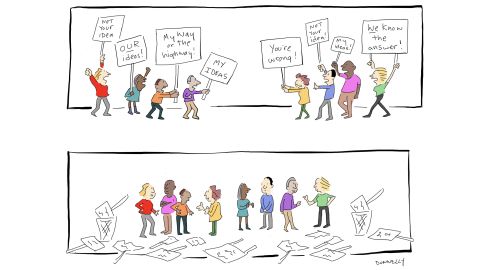
In the next installment of CNN Opinion’s ongoing series, “America’s Future Starts Now,” three current and retired election workers – Natalie Adona of California, Lisa Deeley of Pennsylvania and Tina Barton of Michigan – shared the dangers they faced in the line of duty.
Deeley, who faced a credible death threat after a video of her was posted online, recalled: “I had two plain-clothes Philadelphia police officers assigned to follow me wherever I went – including the bathroom.” Though this job has traditionally been a low-risk form of public service, since 2020 that reality has changed for these three women and many other officials who oversee federal, state and local elections.
Given that a majority of Americans believe US democracy is broken, 12 leading thinkers shared their ideas about how to repair it. One of them, US Marine veteran Joe Plenzler, pointed out that the “military – including its veterans – is one of the most trusted institutions in our society” and made the case for enlisting veterans as poll workers – both for their trustworthiness and for their trained abilities to deescalate tensions and address potential threats. Another participant, filmmaker Ken Burns, wrote: “To paraphrase historian Deborah Lipstadt who appears in my latest project, ‘The U.S. and the Holocaust,’ the time to save a democracy is before it is lost – and that requires people paying attention, filtering sources of news and beginning a politics of compromise built on conversation and storytelling now.”
For more:
Patagonia CEO Ryan Gellert: Why business leaders should make it easier for employees to vote
“Why does Russia bomb us, Mommy?”
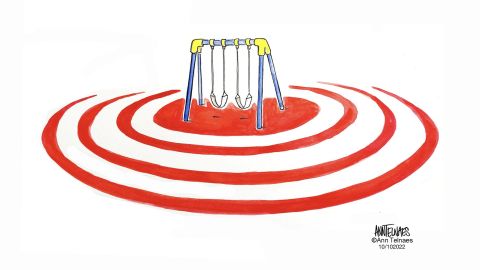
Last weekend, an explosion rocked a strategic Crimean bridge, delivering a heavy blow against Russian forces that prompted both jubilation and fear of Russian retribution in Ukraine. “On Monday, those fears were realized,” wrote Michael Bociurkiw from Odesa. “The strikes occurred nationwide just as people were headed to work and while kids were being dropped off at schools,” he observed. “One of the most resilient Ukrainians I know” texted: “I’m not well right now.”
For Nonna Stefanova, the attacks by “Russian missiles scorched a children’s playground in Kyiv that my family calls ‘our playground,’ leaving behind a gaping crater.” Russia’s nationwide bombardment demanded that she, like other Ukrainian mothers, rouse her family to seek shelter. Her son Askold, age nine, asked her, “Why does Russia do it?” Her answer: “I told him the truth: because the Russians don’t want us to exist.”
Despite Russian President Vladimir Putin’s aggression, his “so-far-disastrous invasion of Ukraine is turning the former idol of the far right into a toxic figure among many who used to be his greatest admirers,” opined Frida Ghitis after the UN General Assembly voted overwhelmingly on Wednesday to reject Putin’s annexation of Ukrainian territory.
“Leaders of the extreme right, seeing the transformation in popular opinion, have pivoted sharply. After championing a Russian leader who was already dictatorial and ruthless, they now seek to benefit from the economic havoc triggered by Putin’s war, while distancing themselves from a man who is now seen not only as a moral pariah by many of his followers, but also as a catastrophically ineffective leader.”
Facing a uniquely American problem
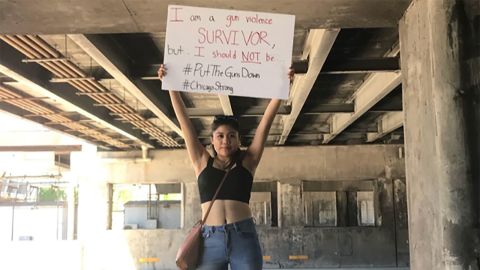
The corrosive trauma of mass shootings and gun violence in America – and the question of whether justice and accountability are even possible – took center stage this week in two courtrooms. In one, far-right conspiracy theorist Alex Jones faced judgment for defaming and intentionally inflicting emotional distress on the families of victims of the 2012 Sandy Hook massacre; in another, a jury recommended that Parkland school shooter Nikolas Cruz spend life in prison without the possibility of parole for killing 17 people – avoiding the death penalty that many observers, some family members of the victims included, felt Cruz deserved.
“Though many were shocked he didn’t receive the death penalty, and many victims’ family members were visibly upset by the decision, it’s wrong to assume this would have automatically brought them solace,” wrote Emilia Benton for NBC Think. Benton’s mother was murdered in 1998 by a man known as the “Railroad Killer,” and while he was executed for his crimes, “the sentencing and ultimate punishment he received in many ways made it more difficult to move forward in my life and achieve any sense of closure.”
Moving forward after experiencing gun violence is never a linear process, reflected Katherine Pisabaj. “I always used to be the happiest, most cheerful person. That’s not who I am anymore. My life changed on February 25, 2018, the day I was shot,” Pisabaj wrote. “After years of healing, I am back to the most normal life I can now have. But recovering from this sort of trauma is not a straight path.
“Last month was the first time I passed a shooting scene in Chicago since I was shot. I was on my way to the laundromat and drove by where three people had been shot. I fell apart. My boyfriend held my hand as my mom tried to comfort me over the phone. … I battle with anxiety and depression and sometimes feel so sad, even when I know I should be happy. It can be a constant battle.”
For more:
Guns and crime weigh on Americans’ minds. 6 experts propose ideas to lighten the load
Joey Jackson: School shooting verdicts raise questions about viability of justice system
Students reject Sasse
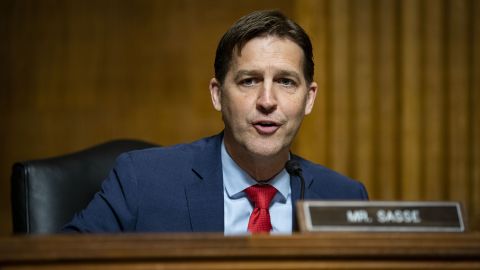
Earlier this month, a search committee unanimously recommended US Sen. Ben Sasse – a Republican from Nebraska, historian and former president of Midland University (student body less than 2,000) – as the sole finalist for president of the University of Florida (student body more than 60,000). When Sasse visited the school Monday, students turned out to protest.
Sasse’s impending appointment threatens to turn the University of Florida into a partisan plaything and “defiles the ideas of a public university of equity and as a common good,” contended David M. Perry. He wrote that not only would Sasse’s anti-LGBTQ and anti-abortion politics have enormous sway in a place where queer students already feel threatened and many women receive health care from university-affiliated sources, but Sasse also got the job after Gov. Ron DeSantis signed a measure decreasing transparency about applicants for college presidencies.
The Washington Post’s Jennifer Rubin maintained that DeSantis’ agenda to bend his state’s flagship university to his personal political will was evident: “No one can seriously argue that Sasse is the finest candidate in the country for the position. DeSantis might as well have put in the job description: ‘Compliant Republican hostile to liberal ideas.’”
Carlos Lozada framed his skepticism through the lens of having read Sasse’s “generic, forgettable” book “Them: Why We Hate Each Other — and How to Heal.” Wrote Lozada in the New York Times: “Books, like politicians, can impress on their own merits, or they can just sound good compared to the competition. No doubt, Sasse is more intellectually stimulating than the election-denying conspiracists who have overrun his Republican Party. But shouldn’t the bar remain higher than that?”
How (not) to respond to Kanye West
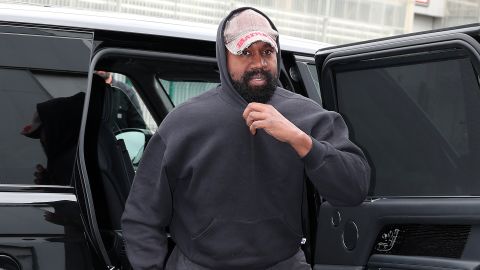
Days after Kanye West (along with right-wing influencer Candace Owens and group of models) appeared at Paris Fashion Week wearing shirts West had designed reading, “White Lives Matter,” he posted violent and antisemitic messages to Twitter and Instagram (both platforms removed posts and locked his accounts). Amid these latest developments, which follow his enmeshment in Trumpism and misogynist trolling of his ex-wife Kim Kardashian, many were asking: How should we respond to him this time?
There’s a lot we don’t know about Kanye West, but what “we do know is that the ideas Kanye is circulating are old, terrible, and powerful. They are death-dealing words,” wrote Imani Perry in her newsletter for The Atlantic. “And whenever someone who is widely influential traffics in such ideas, there is cause for alarm. The thing about ideologies of domination is that they aren’t individual possessions so much as accumulated beliefs and practices. Whether or not Kanye ‘means it’ is inconsequential to the question of whether his words are harmful. They are.”
“The appropriate response to Kanye West’s latest intentional bigoted provocations,” wrote Jill Filipovic, “is fairly simple: Condemn the message, and encourage West, who reportedly struggles with mental health issues, to get help and get out of the public eye.”
The thorniest problem with that obvious course of action, noted Filipovic, is the “indecent and dangerous” embrace of West by extremist conservatives – notably Indiana Attorney General Todd Rokita and Fox News personality Tucker Carlson – “who are using this moment to amplify themselves because they realize that West’s bigotry may well resonate with their followers.” The ongoing embrace of West on the right is “indefensible – and much more dangerous than a few tweets from a single musician,” Filipovic argued.
Don’t miss
Patrick T. Brown: It’s time to launch a counterattack on the abortion issue, Republicans. Here’s how
Dean Obeidallah: Tuberville’s racially charged remarks should be condemned
Ian Johnson: China had a system. Then along came Xi
Ryan Roslansky and Byron Auguste for CNN Business Perspectives: It’s time for employers to stop caring so much about college degrees
Jason D. Greenblatt: Saudi Arabia and the UAE aren’t vassal states of the US
Saying goodbye to an all-time icon
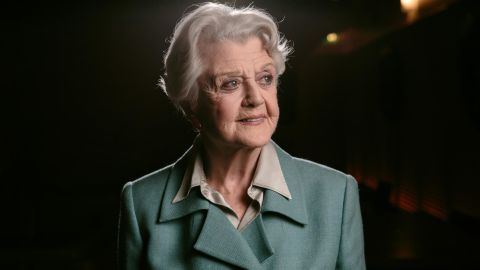
“An industry misfit, she was forced to transform the less sexy, less obvious roles she was often offered into gems that ensured she was constantly introduced to new generations with a fresh image. Ultimately, they showcased a self-confidence and sprawling talent that sealed her place as an all-time Hollywood icon,” wrote Holly Thomas of Angela Lansbury, who died this week at 96.
Lansbury was nominated for an Oscar for her very first film, “Gaslight,” in 1944, won multiple Tony Awards (including for legendary performances in “Mame,” “Gypsy,” “Sweeney Todd” and “Blithe Spirit”) and starred as Jessica Fletcher in the hit series “Murder, She Wrote.”
She coped with an industry that didn’t know what to make of her by casting off the ill-fitting labels of “starlet” or “character actor,” refusing to be confined to a single genre or archetype. She surpassed the limitations imposed on her as an actress in a career that spanned seven decades and left gender stereotypes in the dust – whether portraying villainous matriarch Eleanor Iselin in the 1962 political thriller “The Manchurian Candidate” or voicing the grandmotherly teapot Mrs. Potts in Disney’s 1991 animation, “Beauty and the Beast.”
Lansbury also used her star power on television to advocate for both herself and those with less clout – striking back against Hollywood’s pervasive ageism and misogyny. Marveled Thomas: “Her tenacity throughout her working life, setback after setback, year after year, ensured that new generations encountered her in an array of roles so diverse that when she was finally awarded her Oscar for lifetime achievement in 2013, Geoffrey Rush paid tribute to her as the ‘living definition of range.’ Now, when fans picture Angela Lansbury, they don’t see a starlet frozen in black and white, all tight curls and wide eyes. They see a grown woman, vital, in full color.”
"Opinion" - Google News
October 16, 2022 at 07:39PM
https://ift.tt/9K53qmy
Opinion: Trump's all-caps rage is back. Has America changed? - CNN
"Opinion" - Google News
https://ift.tt/tbEriwa
Shoes Man Tutorial
Pos News Update
Meme Update
Korean Entertainment News
Japan News Update
No comments:
Post a Comment